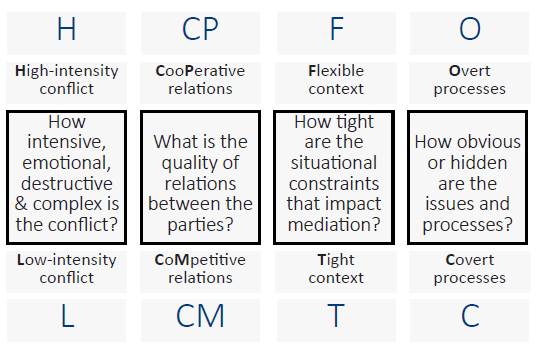Mediation Adaptivity Assessment Tool (MAAT)
Overview
Through the development of our research agenda on the basic dimensions of mediation and the role of mediator adaptivity, optimality and systemic efficacy in disputant and mediator satisfaction, fairness, efficiency, and sustainability of agreements, we are currently working on developing an advanced mediation toolkit and training. The Mediation Adaptivity Assessment Tool (MAAT) will include: a practical overview of our empirical model, a set of practical tools and questionnaires to categorize mediation-types, mediator competency, adaptivity, and optimality (or the capacity to use the right mediation approach taking into account the basic dimensions of the mediation situation). We are also working on developing case studies and other materials to enhance our educational offerings and training initiatives.
Publications
Putting the Peaces Together: Introducing a Situated Model of Mediation
By Peter T. Coleman, Katharina Kugler, Christianna Gozzi, Kyong Mazzaro, Nora El Zokm, and Kenneth Kressel (in progress)
Although academic research on mediation has progressed considerably over the last few decades, it still faces considerable challenges to its practical relevance. Today, the findings from research on mediation present a fractured, piecemeal understanding of what constitutes “effective mediation” and how to achieve it. Research is typically either micro (e.g., mediator style) and decontextualized from the broader system of conflict management, or macro (e.g., case comparisons) and disconnected from mediator decisions and action. As a consequence, many models of mediation practice are not derived from sound theory or evidence-based research (Coleman, 2011). Knowledge generated within academia oftentimes does not reach practitioners and valuable field experiences and practices rarely inform academia – impeding mutual learning and development (Honeyman, 2009; UN Report, 2012).
